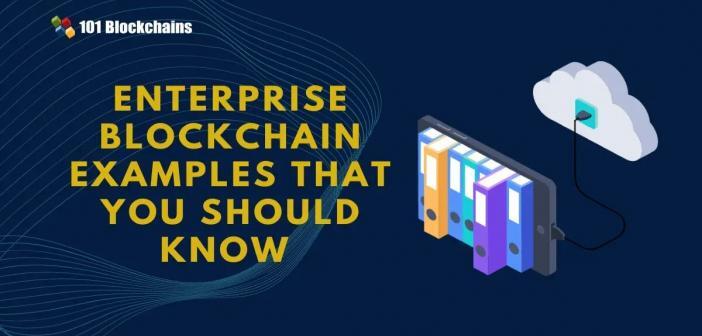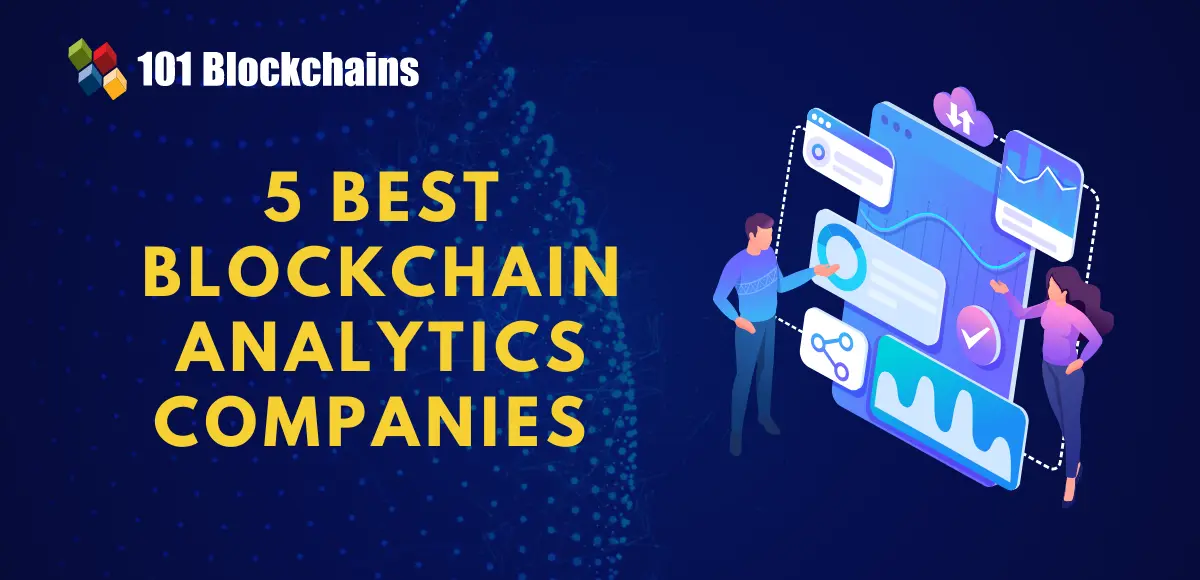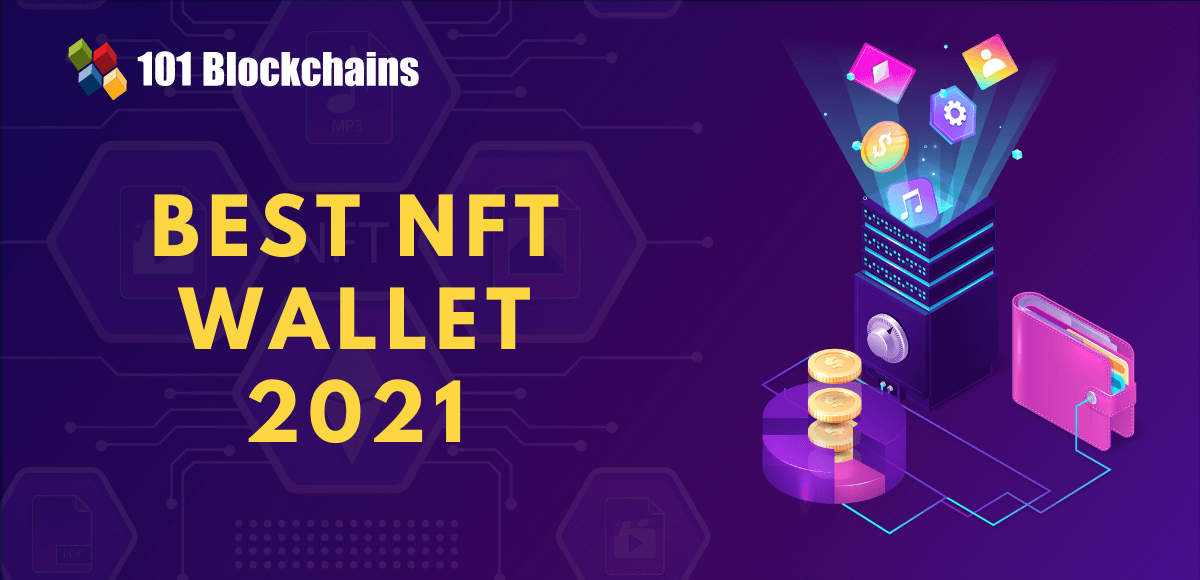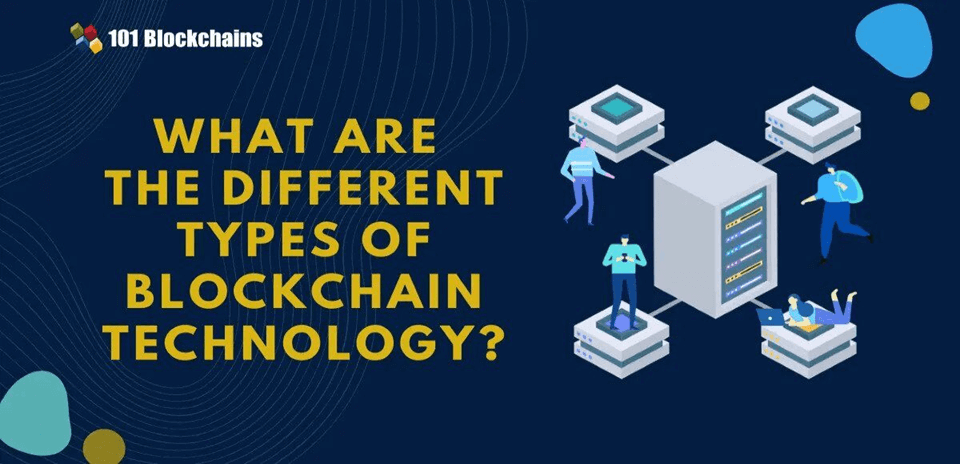Learn how blockchain truly works, master key definitions, and uncover what makes smart contracts so "smart." Dive into the fundamentals, gain valuable insights, and start your blockchain journey today!

- Reviews
101 Blockchains
- on September 29, 2021
Enterprise Blockchain Examples That You Should Know
This article offers the names of the sectors for enterprise blockchain examples with companies that are already working in that field.
Have you ever wondered how enterprises use blockchain? If you do, then you have come to the right place as we are going to share the ten enterprise blockchain examples out there.
Blockchain has wholly transformed enterprises. Companies are ready to deal with the change as it gives them a competitive advantage. Also, there are many use-cases of blockchain in enterprise settings. Its ability to be customized is what makes it so appealing to the businesses out there. With it, there are endless business model possibilities.
But, does that mean your business should also adopt blockchain. Well, it depends on blockchain impacts on your business, now and in the long term.
To help you in the quest to understand enterprise blockchain better, we will be sharing enterprise blockchain examples. Also, enterprise blockchain is different compared to public blockchains.
Build your identity as a certified blockchain expert with 101 Blockchains’ Blockchain Certifications designed to provide enhanced career prospects.
Permissioned Blockchains: The De Facto Enterprise Approach
Public blockchains are free for everyone to join and participate. Organizations cannot afford to share every piece of information. They have critical information that determines their failure and success. If the critical information is not handled correctly, it leads to a loss of competitive advantage and market share.
That’s where permissioned enterprise blockchains come in. All the enterprise blockchain frameworks support permissioned features. That’s why we will also be discussing the permissioned blockchain example. Mostly, the frameworks offer the ability to handle permissioned networks with public features. This means that companies can keep their information secure while enabling other end users to connect to the blockchain network — and ensuring proper information flow.
Permissioned blockchain for supply chain has a plethora of use cases. Supply chain always needs optimal inflow and outflow of information. If not done correctly, it can lead to losses.
Identifying Proper Enterprise Blockchain Examples/Use-Cases
As a business, your job is to identify the instances where you need blockchain. If you identify it correctly, it can help you get better results from the blockchain. Let’s go through the following questions.
- Does your business interact with multiple entities for data?
- Is data or transaction visibility important for your partners?
- Is your current information-sharing system less secure or costly?
If you answered all the questions as “yes,” then you have a blockchain use-case at your hands. But, before you jump and choose an enterprise blockchain framework, it is advisable to determine its impact before changing. Blockchain implementation is not simple and can also cost a lot.
Curious to learn about blockchain implementation and strategy for managing your blockchain projects? Enroll Now in Blockchain Technology – Implementation And Strategy Course!
Best Enterprise Blockchain Examples That You Should Know
The best way to learn about blockchain is to go through the examples. Our list of 10 enterprise blockchain examples will cover the majority of the use-cases. We will try to give examples of enterprise blockchain platforms that are implementing it — so that you can get a proper context.
Nothing beats real-world use-cases, and that’s why we need to go through them.
Supply Chain Management
Blockchain in supply chain management is undoubtedly the number one enterprise blockchain example. Almost any industry or company uses the supply chain to ensure the proper flow of products. If it falters even by a fraction, a company loses on profit or market share. That’s how important the supply chain is.
Clearly, blockchain provides the necessary framework to make the supply chain more efficient, trustworthy, and cost-effective. The use of blockchain ensures that transparency gets ingrained in the whole supply chain. It solves the number one issue that the supply chain suffers from — fraud.
Blockchain also provides cost-effective measures to improve overall network efficiency. Meanwhile, it also makes sure that data/information can flow deeply through the network without being delayed. All these factors help the supply chain to become what it is.
One such supply chain blockchain example is IBM’s Food Trust. IBM’s collaboration with leading food providers is working towards building the next generation supply chain solution using blockchain. It has multiple benefits, including brand trust, supply chain efficiencies, and most importantly, food safety.
- Need for blockchain in supply chain
- Traceability – trace products throughout their journey
- Transparency – Information is transparent so that it can be verified
- Trading – Helps run trade without much third-party intervention
Examples: Treum, Luxarity, GenuineWay, and others.
Excited to learn about the supply chain in blockchain? Enroll Now in Enterprise Blockchains and Supply Chain Management Course
HealthCare
Human health comes at the top of government priorities in the 21st century. With medical science improving at a rapid pace, it is the technology that is helping it do so. Blockchain is yet another technology that can change how healthcare will function in the future.
So, what’s wrong with current healthcare? Right now, the current healthcare ecosystem works in a centralized manner. If a healthcare silo has patient health information, then it becomes hard for other entities to gain access to it. But the biggest issue is the fraudulent supply chain process which enables bad entities to send and distribute fake medicines to the patients.
With blockchain for healthcare, all of these issues can be resolved. Patients once profiled do not have to worry about sharing their information. Once blockchain has a copy of them, they can visit doctors and provide the information — that is accurate and is protected from any modifications. Research institutes can also benefit from decentralized network sharing as they can access the public information and utilize it to find cures to complex medical problems.
One such healthcare blockchain example is Medicalchain — It is a startup that provides patients to store their health records safely. It removes the need for patients to keep track of their medical data. This also means that there is one version of medical data that both patients and medical practitioners can trust.
Big healthcare enterprises can also take blockchain advantage, and improve how they manage their processes related to drugs, patient’s data, and management.
Need for blockchain in healthcare
- To secure electronic health records (EHRs)
- To improve drug traceability
- Clinical trials data security
- Patient consent management
Examples: Nebula Genomics, Iryo, Guardtime, Gem
Finance and Banking
Our financial systems are at the core of our economy. If they work efficiently, we grow at a rapid pace. The same holds true for our banking system, which is used by trillions of people worldwide.
Banks and financial institutions have already understood the importance of blockchain. With trade finance blockchain deployments, banks are already seeing a transformation in how they do settlements. They are saving a lot when it comes to cross-border settlement. The financial sector, on the other hand, can also improve with blockchain.
When it comes to financing, the following aspects can be improved drastically
- Trade Finance
- Syndicated Loans
- Automated Compliance
- Equity Post-Trade
So, how does it equate the enterprise financial institutions? They can take advantage of the already available R3 Corda framework which provides financial institutions to build their own enterprise blockchain.
Examples: UnicaCredit Banka, Ripple, R3 Corda
Want to know how blockchain is upgrading a traditionally paper and manual-intensive business? Enroll now in Enterprise Blockchains and Trade Finance Course
Energy
The energy sector can benefit immensely from blockchain when it is going through an innovative period. Enterprises in the energy sector now offer electricity at a fixed price. But with blockchain, things can change and evolve beyond the enterprise landscape.
Innovation in the energy sector is paramount. There are rooftop solar, smart metering, and electric vehicles. With so much innovation, blockchain can help the energy sector to grow beyond its current limitation by providing a seamless global network of energy. By doing so, people can move to more of a supply and demand where the prices can fluctuate depending on the availability.
There are many use-cases that the energy sector can benefit from with blockchain. One instance is the efficiency at which energy is generated and distributed in a grid. Also, it will help improve the overall cost associated with energy distribution. Blockchain will simplify how new users register for energy requirements — for supply or demand. The utility providers can also benefit from blockchain as they can keep better tracking of the grid materials required to establish a proper global network.
Also, the oil sector can also see immense benefits. The oil and gas sector has billions of users. The actors in it can benefit from the transparency, trust, and reliability brought by blockchain. It will also help remove any inefficiency in the processes or infrastructure.
Need for blockchain in energy
- Better transparency
- Change in business model → more flexibility
- The improved supply chain for grid management and installation
- Improved privacy in the energy sector
- Better environmental sustainability
- Stakeholders have better transparency.
Also, the key use-cases in the energy sector include utility providers, peer-to-peer energy trading, commodity trading, electricity data management, and so on.
Company Examples: Ondiflo, Radiant Earth
Identity
Enterprises are very keen when it comes to identity protection. After all, they want to protect the interest of their users. Currently, the business processes are not up to the mark when it comes to identity protection. Identity theft is a widespread occurrence when it comes to an enterprise solution. Data hacks are mostly based on identity theft, where an intruder does identity theft and gets access to critical information in a network.
Enterprises can take advantage of blockchain to improve identity management. A blockchain-based digital identity management system can change how users can interact with each other, and also makes no one can do identity theft.
IBM Blockchain understands the importance of identity theft and offers IBM Verify Credentials that helps enterprises to manage employees and other critical personal identities through a decentralized network. The new ecosystem works pretty well in the enterprise ecosystem. It takes care of password resets, privacy regulations, identity management challenges, and so on. With it, permissioned networks can work with a high level of trust.
Need for blockchain in Identity
- Secures data from malicious actors
- Ensure proper password management system
- Identities are harder to crack and copy
- Improved privacy regulations
Companies Examples: IBM Blockchain, Validated ID, Metadium, TheKey
Want to understand the concept of decentralized identity? Enroll now in the Decentralized Identity Fundamentals Course!
Real Estate
Real estate is one of those sectors that need reform to grow. Currently, the process of dealing with a property is slow and can cost a lot of money. In fact, it is so painfully slow that it can take anywhere between months to buy a property.
That’s not the only problem real estate suffers from. Many fraud activities take place in real estate. There is also land mafia that takes part in illegal activities. With an ever-increasing demand for real estate, it is bound to grow in the future, but its growth will always be limited.
But, with blockchain and distributed ledger technology, things will change drastically. It will enhance the trust and traceability in the whole global real estate ecosystem. Moreover, it will also bring down the cost of the deals by a significant amount — due to less use of paperwork. The mediator’s role will also be minimized – which can improve the number of errors that occur during transmission of information or paperwork.
So, what does it have to do with enterprise blockchain? The global economy of real estate will have to utilize enterprise blockchain features to make the most out of DLT technology. It can give the network the required flexibility to share information while keeping more sensitive information intact. Real estate companies can also work more efficiently by using enterprise blockchain.
With blockchain for real estate, the following changes are possible —
- Proper real estate funds and asset management
- Deed records and land titles done digitally
- Smart contracts facilitating change of ownership
- Leasing and payments will become more fluid
- Real-time accounting will become possible
Companies Example: TruSet, Imbrex
Want to learn about the intersection of blockchain and real estate? Enroll Now in Blockchain For Real Estate Masterclass
Government
Government is always keen when it comes to new technologies such as distributed ledger technology. For the government, it is important to utilize them as it can give them the ability to govern.
Blockchain enables the government to stay at the top of their processes. Centralized government is prone to many issues, including corruption, cost, privacy, and digitization.
Governments can run their election in the most transparent way. It can also enable anyone with their rights to participate in the election irrespective of their location or situation they are in. They can also curb the digital identity problems by moving their entire identity management systems on the blockchain.
With blockchain for government can also automate a lot of paperwork — improving communication between different departments and ensuring greater reach for the information. The people can also trust the government as public information can easily be available online.
All these need to be implemented at a large scale, just like how it would be done in enterprise blockchain solutions.
Need for blockchain in government
- Smart regulations
- Identity management
- Financial and budgeting management
- Process management
The use-cases will result in smart cities, better healthcare, better transport, easy education and professional qualifications, and so on.
Examples: Smart Dubai Initiative
Media and Entertainment
Piracy is one of the biggest concerns for the entertainment and music industry. Almost every form of content generated is pirated — depriving creators their right to earn from their work. With blockchain, all of these can change.
Decentralized enterprise blockchain networks will also improve how new content creators reach their audience. The current media powerhouse has their monopoly, which doesn’t favor new content creators. With blockchain, anyone can reach their audience — and have the chance to earn money.
Media studios can also benefit from blockchain by implementing blockchain. It can help them improve their intellectual property hold. It can also improve their other process, including the ability to share information among creators.
Examples: Block.One
Not sure how to join 101 Blockchains affiliate program? Check Now: How to Join 101 Blockchains Affiliate Program?
Insurance
The insurance industry is in dire needs for change. The current insurance industry is suffering from lots of challenges, including their inability to maintain proper data, inefficient policy claim, bad billing systems, poor support, and so on!
There is also a lot of ambiguity when it comes to losing conditions. In short, the insurers suffer the most when it comes to using their policy when the need arises.
The blockchain for insurance has the ability to change how things works. R3 Corda is one of the enterprise blockchain companies for insurance that offers insurance companies to create a network of trust. The network can be used by brokers, insurers, reinsurers, and cedants.
Corda is also known for seamless asset transfer and providing great security for the insurance out there. The claim systems are also improved thanks to pre-conditioned smart contracts. Other frameworks, such as IBM blockchain also have proper features for the Insurance sector to implement.
Companies examples: Etherisc, Fidentiax.
Education
Enterprise blockchain is equally useful in the education sector. There are many ways the education sector can benefit from blockchain or distributed ledger technology. Even big companies can use ledger technology to provide training to their newly hired employees and ensure that new skills are imparted without the need to spend millions of dollars.
The first benefit that we will see is how education will become more accessible to learners. It will also help streamline the credentials and degree completion — as it will provide the digital certificate to the learner. The digital certificate can be used anywhere because it can be verified when possible.
Overall, the blockchain for education sector can improve on how it can provide certification. The employees will also have less headache when it comes to credentials verification.
Companies example: Blockcerts, ODEM, Blockchain Education Network, Parchment
Start your blockchain journey Now with the Enterprise Blockchains Fundamentals
Conclusion
This leads us to the end of our enterprise blockchain examples. We managed to list ten enterprise blockchain examples where we learned how blockchain could be utilized in an enterprise setting. The examples also cover how enterprise blockchain frameworks can be utilized.
*Disclaimer: The article should not be taken as, and is not intended to provide any investment advice. Claims made in this article do not constitute investment advice and should not be taken as such. 101 Blockchains shall not be responsible for any loss sustained by any person who relies on this article. Do your own research!






